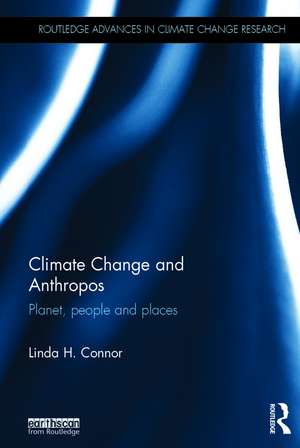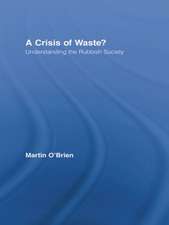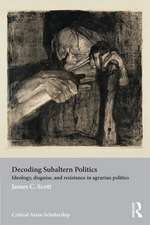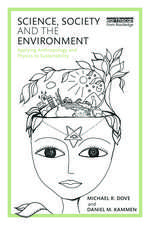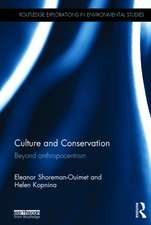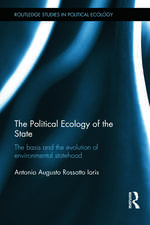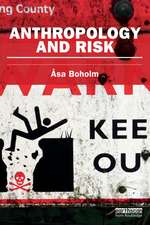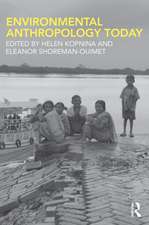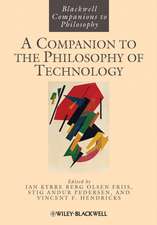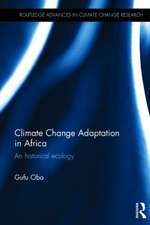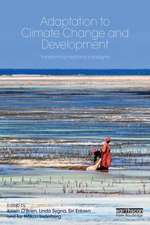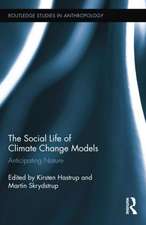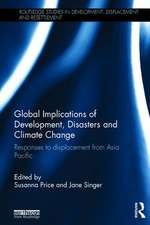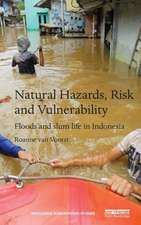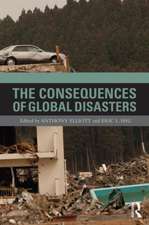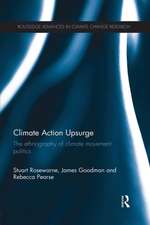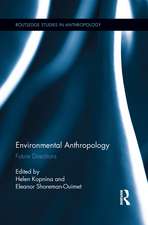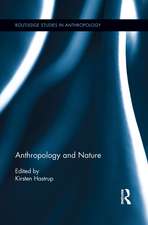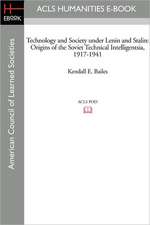Climate Change and Anthropos: Planet, people and places: Routledge Advances in Climate Change Research
Autor Linda Connoren Limba Engleză Hardback – 19 feb 2016
Anthropos, in the sense of species as well as cultures and ethics, locates humans as part of much larger orders of existence fundamental when thinking about climate change. This book offers a new way of exploring the significance of locality and lives in the epoch of the Anthropocene, a time when humans confront the limits of our control over nature. Many scholars now write about the ethics, policies and politics of climate change, focussing on global processes and effects. The book s innovative approach to cross-cultural comparison and a regionally based study explores people s experiences of environmental change and the meaning of climate change for diverse human worlds in a changing biosphere.
The main study site is the Hunter Valley in southeast Australia: an ecological region defined by the Hunter River catchment; a dwelling place for many generations of people; and a key location for transnational corporations focussed on the mining, burning and export of black coal. Abundant fossil fuel reserves tie Hunter people and places to the Asia Pacific the engine room of global economic growth in the twenty-first century and the largest user of the planet s natural resources. The book analyses the nexus of place and perceptions, political economy and social organisation in situations where environmental changes are radically transforming collective worlds.
Based on an anthropological approach informed by other ways of thinking about environment-people relationships, this book analyses the social and cultural dimensions of climate change holistically. Each chapter links the large scales of species and planet with small places, commodity chains, local actions, myths and values, as well as the mingled strands of dystopian imaginings and strivings for recuperative renewal in an era of transition."
| Toate formatele și edițiile | Preț | Express |
|---|---|---|
| Paperback (1) | 279.13 lei 43-57 zile | |
| Taylor & Francis – 21 dec 2017 | 279.13 lei 43-57 zile | |
| Hardback (1) | 701.56 lei 43-57 zile | |
| Taylor & Francis – 19 feb 2016 | 701.56 lei 43-57 zile |
Din seria Routledge Advances in Climate Change Research
-
 Preț: 152.57 lei
Preț: 152.57 lei -
 Preț: 311.14 lei
Preț: 311.14 lei -
 Preț: 280.92 lei
Preț: 280.92 lei - 8%
 Preț: 376.64 lei
Preț: 376.64 lei -
 Preț: 310.75 lei
Preț: 310.75 lei -
 Preț: 207.01 lei
Preț: 207.01 lei -
 Preț: 309.87 lei
Preț: 309.87 lei -
 Preț: 320.22 lei
Preț: 320.22 lei -
 Preț: 312.54 lei
Preț: 312.54 lei -
 Preț: 310.14 lei
Preț: 310.14 lei - 8%
 Preț: 390.79 lei
Preț: 390.79 lei -
 Preț: 287.02 lei
Preț: 287.02 lei -
 Preț: 295.88 lei
Preț: 295.88 lei -
 Preț: 482.62 lei
Preț: 482.62 lei -
 Preț: 406.42 lei
Preț: 406.42 lei -
 Preț: 478.77 lei
Preț: 478.77 lei - 18%
 Preț: 1000.27 lei
Preț: 1000.27 lei -
 Preț: 449.41 lei
Preț: 449.41 lei -
 Preț: 449.41 lei
Preț: 449.41 lei - 12%
 Preț: 325.34 lei
Preț: 325.34 lei - 18%
 Preț: 1172.58 lei
Preț: 1172.58 lei - 18%
 Preț: 1001.84 lei
Preț: 1001.84 lei - 18%
 Preț: 1074.49 lei
Preț: 1074.49 lei -
 Preț: 408.16 lei
Preț: 408.16 lei -
 Preț: 449.41 lei
Preț: 449.41 lei - 31%
 Preț: 762.58 lei
Preț: 762.58 lei -
 Preț: 408.74 lei
Preț: 408.74 lei -
 Preț: 299.52 lei
Preț: 299.52 lei - 28%
 Preț: 820.32 lei
Preț: 820.32 lei - 18%
 Preț: 1057.09 lei
Preț: 1057.09 lei - 18%
 Preț: 1055.51 lei
Preț: 1055.51 lei - 18%
 Preț: 1053.92 lei
Preț: 1053.92 lei -
 Preț: 416.22 lei
Preț: 416.22 lei - 18%
 Preț: 1053.16 lei
Preț: 1053.16 lei - 30%
 Preț: 847.73 lei
Preț: 847.73 lei - 25%
 Preț: 851.82 lei
Preț: 851.82 lei -
 Preț: 413.94 lei
Preț: 413.94 lei - 18%
 Preț: 1000.27 lei
Preț: 1000.27 lei - 18%
 Preț: 1226.79 lei
Preț: 1226.79 lei -
 Preț: 449.41 lei
Preț: 449.41 lei - 18%
 Preț: 1062.16 lei
Preț: 1062.16 lei - 26%
 Preț: 764.20 lei
Preț: 764.20 lei
Preț: 701.56 lei
Preț vechi: 855.56 lei
-18% Nou
134.26€ • 139.65$ • 110.84£
Carte tipărită la comandă
Livrare economică 14-28 aprilie
Specificații
ISBN-10: 0415718538
Pagini: 222
Ilustrații: 30 black & white illustrations, 27 black & white halftones
Dimensiuni: 156 x 234 x 18 mm
Greutate: 0.48 kg
Ediția:1
Editura: Taylor & Francis
Colecția Routledge
Seria Routledge Advances in Climate Change Research
Locul publicării:Oxford, United Kingdom
Public țintă
PostgraduateCuprins
Recenzii
--J. L. Rhoades, Antioch University New England, February 2017 issue of CHOICE
Notă biografică
Professor Linda Connor is Chair of Social Anthropology at the University of Sydney, Australia.
Descriere
Anthropos, in the sense of species as well as cultures and ethics, locates humans as part of much larger orders of existence fundamental when thinking about climate change. This book offers a new way of exploring the significance of locality and lives in the epoch of the Anthropocene, a time when humans confront the limits of our control over nature. Many scholars now write about the ethics, policies and politics of climate change, focussing on global processes and effects. The book s innovative approach to cross-cultural comparison and a regionally based study explores people s experiences of environmental change and the meaning of climate change for diverse human worlds in a changing biosphere.
The main study site is the Hunter Valley in southeast Australia: an ecological region defined by the Hunter River catchment; a dwelling place for many generations of people; and a key location for transnational corporations focussed on the mining, burning and export of black coal. Abundant fossil fuel reserves tie Hunter people and places to the Asia Pacific the engine room of global economic growth in the twenty-first century and the largest user of the planet s natural resources. The book analyses the nexus of place and perceptions, political economy and social organisation in situations where environmental changes are radically transforming collective worlds.
Based on an anthropological approach informed by other ways of thinking about environment-people relationships, this book analyses the social and cultural dimensions of climate change holistically. Each chapter links the large scales of species and planet with small places, commodity chains, local actions, myths and values, as well as the mingled strands of dystopian imaginings and strivings for recuperative renewal in an era of transition."
